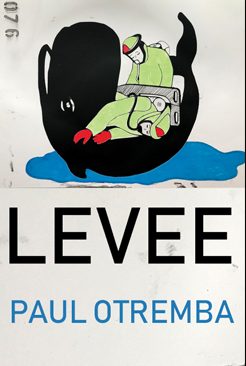
Poetry | paper | $15.95 | 128 pgs |
ISBN-13: 978-1-945588-41-9
The poems in Paul Otremba’s Levee explore the intersection between the ecological, the political, and the personal in a world built on oil and greed. The city of Houston is at once backdrop and metaphor for the ways
in which violence—both natural and manmade—have become part and parcel of twenty-first century life. “It’s a luxury to be this calm,” Otremba writes in the opening poem, a held-breath between the disastrous effects of hurricanes and cancer. Yet Otremba’s exquisite lines manage to wrest meaning from the devastation wrought by both global warming and a terminal illness: “If there is a lesson / on how not to worry, it’s that you’re not stuck only being one thing, /the multitudes in me and the multitudes in you.”
Expectancy
He places a pillow across my lap,
then lets loose a joke about saving dignity.
He wants to check my scar, and the whole team
descends from their orbit to watch his cold hand
test a red line the length of my stomach
that closes where the stomach had been.
From their fingernail’s slice of cratered moon
they assemble the daily surgical theater
where I come and go, lifting and dropping my gown.
His fingers probe around the plate, reading auguries.
Then like a held breath retreating from stench,
the team deflates, the demonstration ended.
But today, there’s special providence:
the pathology drops like a winged thing
wounded. Like the one I’d found on the patio,
its feet still curled around some absent branch.
The sparrow had the look of a toppled-over
sleepwalker. My hand stuck in protective layers
of thin plastic grocery bags, I was afraid
that what I touched would spark, would wake and fly,
even though that’s what I should have wanted
for it. No readiness can cure that.
“Levee is simply beautiful: thrillingly intelligent, Keatsian in its restlessness, and filled with love even for the flood-soaked ruins of our America, where the levees of the old order are always giving way. By turns scathingly ironic and heartbreakingly sincere, Otremba has written the poems we need in this new century, and they confirm that he is an essential voice of his generation.” —Patrick Phillips
“There is absolutely nothing naive in Paul Otremba’s third collection, Levee, which confronts some of the most difficult existential and cultural realities I can imagine, but likewise there is none of the cynicism or easy irony a poet writing in our time might otherwise understandably resort to. These poems, beautifully haunted by John Keats, among others, revisit and query with honesty and vulnerability whether that chiastic equation about truth and beauty and beauty and truth can really still be true.” —Jennifer Grotz
“…Otremba’s command of form and structure, and the scope of his exploration, make this a worthwhile outing.” Read the full review.